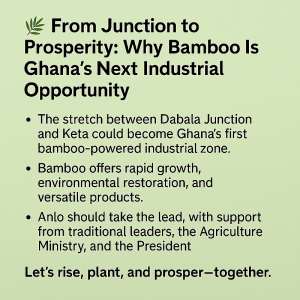
The stretch between Dabala Junction and Keta holds more than just open land—it holds a generational opportunity. With the right vision, this corridor could blossom into Ghana’s first bamboo-powered industrial zone, creating jobs, restoring degraded lands, and strengthening the nation’s 24-hour economy agenda. The time to act is now—and the Volta Region, particularly the Anlo State, is primed to lead.
A Grassroot Catalyst for a National Challenge
Ghana’s economy faces deeply rooted challenges: youth unemployment, ecological decline, over-reliance on imports, and underutilized industrial potential. Bamboo offers a low-tech, high-impact solution grounded in local ecosystems and enterprise.
Unlike traditional hardwoods, bamboo matures in just 3–5 years, thrives on marginal land, and restores soil health. Its versatility is extraordinary—it can become housing panels, furniture, textiles, packaging, charcoal, paper, and even bioenergy. Yet today, its commercial use in Ghana is minimal. That must change.
🌍 Why Anlo Must Lead
Anlo is not only historically cohesive and culturally rich—it is strategically positioned to spearhead a bamboo industrial revolution. With available land, a vibrant youth population, and decades of environmental stewardship, Anlo can become the model for turning green potential into economic prosperity.
This is a clarion call to traditional leaders, civic groups, and political actors: Let Anlo rise and be the blueprint for what a regenerative, inclusive economy looks like.
🌱 From Roots to Revenue: Bamboo as a 24-Hour Economic Driver
The President’s vision of a 24-hour economy demands more than rhetoric—it calls for enterprises that can scale around the clock. Bamboo ticks every box:
Round-the-clock farming and processing: From nursery care to factory shifts. Job-intensive value chains: In cultivation, carpentry, energy, textiles, logistics, and design. Inclusive employment: Particularly for youth, women, and artisans. Export-ready industries: With demand rising for green materials worldwide. Import substitution: Especially in timber, paper, charcoal, and packaging.
With the right investment and policy incentives, the Dabala-Keta corridor could emerge as Ghana’s first eco-industrial bamboo belt—feeding local markets while exporting finished goods to regional and global buyers.
🔧 The Building Blocks of a Bamboo Economy
What would success look like?
Youth-run nurseries producing seedlings for farms and forest buffers Women-led cooperatives crafting bamboo décor, baskets, and modular furniture Rural-based factories converting raw bamboo into durable housing panels Energy startups replacing wood charcoal with clean bamboo briquettes Artisan training centers combining ancestral weaving techniques with new designs Research and development hubs exploring bamboo packaging and pulp innovation
This isn’t a pipe dream—it’s a project of national relevance waiting to be ignited.
🌾 A Call for Leadership
The bamboo vision needs more than goodwill—it needs governance. We respectfully call on:
Anlo’s Traditional Authorities and Civic Leaders to mobilize land, dialogue, and community engagement The Ministry of Food and Agriculture to deliver seedlings, agroforestry expertise, and extension services The Forestry Commission and Environmental Agencies to facilitate land access and climate-smart planning His Excellency John Dramani Mahama to elevate bamboo industrialization as a national legacy program and a pillar of his 24-hour economy vision
Bamboo must be declared a strategic green commodity, backed by funding, policy frameworks, and public-private partnerships.
🌿 Planting Wealth, Not Just Trees
This is not just about bamboo—it’s about belief. Belief in local ingenuity. Belief in economic justice. Belief that the soil beneath our feet can grow not only food, but futures.
From Dabala Junction to Keta, let Ghana demonstrate that inclusive, regenerative industry is possible when land, leadership, and labor align.
Let us rise. Let us plant. Let us prosper—together.
Retired Senior Citizen
Teshie-Nungua
[email protected]


